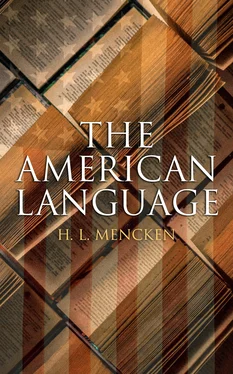§ 5
Archaic English Words
Table of Contents
—Most of the colonists who lived along the American seaboard in 1750 were the descendants of immigrants who had come in fully a century before; after the first settlements there had been much less fresh immigration than many latter-day writers have assumed. According to Prescott F. Hall, "the population of New England ... at the date of the Revolutionary War ... was produced out of an immigration of about 20,000 persons who arrived before 1640 ," 33and we have Franklin's authority for the statement that the total population of the colonies in 1751, then about 1,000,000, had been produced from an original immigration of less than 80,000. 34Even at that early day, indeed, the colonists had begun to feel that they were distinctly separated, in culture and customs, from the mother-country, 35and there were signs of the rise of a new native aristocracy, entirely distinct from the older aristocracy of the royal governors' courts. 36The enormous difficulties of communication with England helped to foster this sense of separation. The round trip across the ocean occupied the better part of a year, and was hazardous and expensive; a colonist who had made it was a marked man,—as Hawthorne said, "the petit-maître of the colonies." Nor was there any very extensive exchange of ideas, for though most of the books read in the colonies came from England, the great majority of the colonists, down to the middle of the century, seem to have read little save the Bible and biblical commentaries, and in the native literature of the time one seldom comes upon any reference to the English authors who were glorifying the period of the Restoration and the reign of Anne. Moreover, after 1760 the colonial eyes were upon France rather than upon England, and Rousseau, Montesquieu, Voltaire and the Encyclopedists began to be familiar names to thousands who were scarcely aware of Addison and Steele, or even of the great Elizabethans. 37
The result of this isolation, on the one hand, was that proliferation of the colonial speech which I have briefly reviewed, and on the other hand, the preservation of many words and phrases that gradually became obsolete in England. The Pilgrims of 1620 brought over with them the English of James I and the Revised Version, and their descendants of a century later, inheriting it, allowed its fundamentals to be little changed by the academic overhauling that the mother tongue was put to during the early part of the eighteenth century. In part they were ignorant of this overhauling, and in part they were indifferent to it. Whenever the new usage differed from that of the Bible they were inclined to remain faithful to the Bible, not only because of its pious authority but also because of the superior pull of its imminent and constant presence. Thus when an artificial prudery in English ordered the abandonment of the Anglo-Saxon sick for the Gothic ill , the colonies refused to follow, for sick was in both the Old Testament and the New; 38and that refusal remains in force to this day.
A very large number of words and phrases, many of them now exclusively American, are similar survivals from the English of the seventeenth century, long since obsolete or merely provincial in England. Among nouns Thornton notes fox-fire , flap-jack , jeans , molasses , beef (to designate the live animal), chinch , cord-wood , homespun , ice-cream , julep and swingle-tree ; Halliwell 39adds andiron , bay-window , cesspool , clodhopper , cross-purposes , greenhorn , loophole , ragamuffin , riff-raff , rigmarole and trash ; and other authorities cite stock (for cattle), fall (for autumn), offal , din , underpinning and adze . Bub , used in addressing a boy, is very old English, but survives only in American. Flap-jack goes back to Piers Plowman, but has been obsolete in England for two centuries. Muss , in the sense of a row, is also obsolete over there, but it is to be found in "Anthony and Cleopatra." Char , as a noun, disappeared from English a long time ago, but it survives in American as chore . Among the adjectives similarly preserved are to whittle , to wilt and to approbate . To guess , in the American sense of to suppose , is to be found in "Henry VI":
Not all together; better far, I guess , That we do make our entrance several ways.
In "Measure for Measure" Escalus says "I guess not" to Angelo. The New English Dictionary offers examples much older—from Chaucer, Wyclif and Gower. To interview is in Dekker. To loan , in the American sense of to lend, is in 34 and 35 Henry VIII, but it dropped out of use in England early in the eighteenth century, and all the leading dictionaries, both English and American, now call it an Americanism. 40 To fellowship , once in good American use but now reduced to a provincialism, is in Chaucer. Even to hustle , it appears, is ancient. Among adjectives, homely , which means only homelike or unadorned in England, was used in its American sense of plain-featured by both Shakespeare and Milton. Other such survivors are burly , catty-cornered , likely , deft , copious , scant and ornate . Perhaps clever also belongs to this category, that is, in the American sense of amiable.
"Our ancestors," said James Russell Lowell, "unhappily could bring over no English better than Shakespeare's." Shakespeare died in 1616; the Pilgrims landed four years later; Jamestown was founded in 1607. As we have seen, the colonists, saving a few superior leaders, were men of small sensitiveness to the refinements of life and speech: soldiers of fortune, amateur theologians, younger sons, neighborhood "advanced thinkers," bankrupts, jobless workmen, decayed gentry, and other such fugitives from culture—in brief, Philistines of the sort who join tin-pot fraternal orders today, and march in parades, and whoop for the latest mountebanks in politics. There was thus a touch of rhetoric in Lowell's saying that they spoke the English of Shakespeare; as well argue that the London grocers of 1885 spoke the English of Pater. But in a larger sense he said truly, for these men at least brought with them the vocabulary of Shakespeare—or a part of it,—even if the uses he made of it were beyond their comprehension, and they also brought with them that sense of ease in the language, that fine disdain for formality, that bold experimentalizing in words, which was so peculiarly Elizabethan. There were no grammarians in that day; there were no purists that anyone listened to; it was a case of saying your say in the easiest and most satisfying way. In remote parts of the United States there are still direct and almost pure-blooded descendants of those seventeenth century colonists. Go among them, and you will hear more words from the Shakespearean vocabulary, still alive and in common service, than anywhere else in the world, and more of the loose and brilliant syntax of that time, and more of its gipsy phrases. 41
§ 6
Colonial Pronunciation
Table of Contents
—The debate that long raged over the pronunciation of classical Latin exhibits the difficulty of determining with exactness the shades of sound in the speech of a people long departed from earth. The American colonists, of course, are much nearer to us than the Romans, and so we should have relatively little difficulty in determining just how they pronounced this or that word, but against the fact of their nearness stands the neglect of our philologists, or, perhaps more accurately, our lack of philologists. What Sweet did to clear up the history of English pronunciation, 42and what Wilhelm Corssen did for Latin, no American professor has yet thought to attempt for American. The literature is almost, if not quite a blank. But here and there we may get a hint of the facts, and though the sum of them is not large, they at least serve to set at rest a number of popular errors.
Читать дальше












